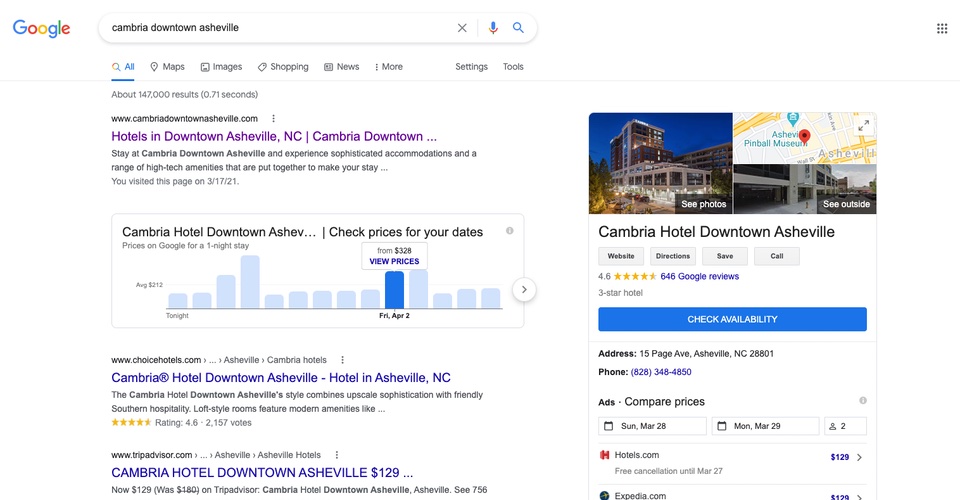3 Ways a Vanity Website Can Improve Your Hotel Property’s SEO

One of the most important pieces of the hotel conversion puzzle is being in front of prospective travelers where and when it matters. When a traveler begins their research on their search engine of choice, does your property come up for the search terms that resonate most?
In the first two parts of our series on vanity websites, we’ve talked about how hotel properties can benefit from vanity websites by showing off their property’s unique personality with dynamic photos and videos. And while it’s true that visuals can increase conversions by more than 200%, independent hotels and management companies can only show off their properties if travelers are able to discover their property in the first place.
Today, we’re going to look at how a vanity website can improve your page ranking on search engines by providing enhanced Search Engine Optimization (SEO). When search engines like Google crawl your hotel website, your keyword choices are key to SEO and discovery. Let’s look at three specific SEO benefits that come with a vanity website.
1. Rank for niche and long-tail keywords
When it comes to SEO, the opportunity really lies within the number of pages that your website has. The more pages you have, the more topics you can cover through different sections and the wider the breadth of keywords that you can go after.
Going back to the Hilton Garden Inn Atlanta Downtown, which we’ve looked at throughout this series, you can see the property only has three pages on their website — a homepage, a rooms page, and a gallery page. With these limited options, this property is extremely limited on how many keywords can be optimized for and thus its ability to rank on Google and other search engines for keywords that might be relevant to the property.
A vanity site, meanwhile, offers a lot of flexibility to create new pages and provide deeper detail on various topics about your property. How many times has your search query been a question or a combination of short, descriptive phrases? These are known as long-tail keywords, and they expand a website’s ability to rank for phrases in the way people often search online.
Switching gears to a Hilton property, if you hover, you can see that their title tag is Hotels in Downtown Minneapolis, Minnesota | Marquette Hotel. The title tag is often a good indication of what keyword a property is going after. On Marquette Hotel’s homepage, you can view their rooms page and see the property is downtown Minneapolis. They also include their dining page, downtown Minneapolis restaurants, their local neighborhood page, and more.
The vanity website approach allows Marquette Hotel to broaden their approach and rank for a range of different keywords and topics they’re going after — from hotels near Target Field to wedding and conference venues in Minneapolis. With more niche keywords and different variations, the SEO value and discoverability of the property is a huge benefit.
2. SERP and the Google real estate game
Keywords give your hotel property the ability to rank for all of the terms travelers might be searching for to find a hotel like yours. But ultimately, it’s all about page real estate.
Once you’ve optimized for search terms, the goal is to rank on the Search Engine Results Page (SERP, as we call it). It’s a real estate game, and the more real estate you can occupy on this page, the better off you’re going to be and the higher likelihood you’re going to get that click from the consumer. According to a study from August 2020, the average Google search session lasts only 76 seconds and only 0.44% of search users visit Google’s second page of results.
A vanity website can help a property improve their ranking for specific keywords, right up there with your typical Brand.com page. Let’s look at the example below where we’ve done a search for Cambria Downtown Asheville. The first organic result on the SERP is their vanity site, followed by their branded website. What this does is it expands the property’s real estate. By having the top two listings, Cambria is pushing somebody else further down the page and maximizing the opportunity to get a user to click one of their results — again, it takes just 76 seconds on average!
When paired with a metasearch marketing strategy like the panel on the right, or a paid search campaign that appears at the top of the results, a property can grab more and more real estate. Having both the vanity listing and brand listing is a strong strategy from a SERP standpoint.
3. Keeping your website content fresh
Google and other search engines are constantly updating their algorithms that determine how and where website pages get ranked. A recent core update from Google placed increased emphasis on quality content that is fresh and relevant.
One way that can often be done is through a blog. In this example from Marquette Hotel’s vanity website, you can see several blog posts — such as family-friendly things to do — that allows the hotel to create longer-form content. This keeps the website fresh but also helps the property rank for some of those important niche keywords that we know people are out there searching for. Even if a hotel property can capture a handful of new visitors to their site by creating useful, interesting and relevant content on an ongoing basis, it acts as another piece of the overall SEO strategy that can provide benefits that are only truly possible through a vanity website.
In the next part of our series on hotel vanity websites, we’ll take a deeper dive into the different types of content that a vanity website offers. If you’re interested in reading more about trends and tips for the hospitality marketing industry, visit our blog.

